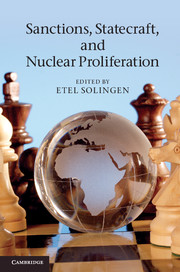
-
Select format
-
- Publisher:
- Cambridge University Press
- Publication date:
- 05 June 2012
- 29 March 2012
- ISBN:
- 9780511862380
- 9781107010444
- 9780521281188
- Dimensions:
- (228 x 152 mm)
- Weight & Pages:
- 0.76kg, 402 Pages
- Dimensions:
- (228 x 152 mm)
- Weight & Pages:
- 0.54kg, 402 Pages
You may already have access via personal or institutional login
Book description
Some states have violated international commitments not to develop nuclear weapons. Yet the effects of international sanctions or positive inducements on their internal politics remain highly contested. How have trade, aid, investments, diplomacy, financial measures and military threats affected different groups? How, when and why were those effects translated into compliance with non-proliferation rules? Have inducements been sufficiently biting, too harsh, too little, too late or just right for each case? How have different inducements influenced domestic cleavages? What were their unintended and unforeseen effects? Why are self-reliant autocracies more often the subject of sanctions? Leading scholars analyse the anatomy of inducements through novel conceptual perspectives, in-depth case studies, original quantitative data and newly translated documents. The volume distils ten key dilemmas of broad relevance to the study of statecraft, primarily from experiences with Iraq, Libya, Iran and North Korea, bound to spark debate among students and practitioners of international politics.
Reviews
‘Etel Solingen’s 2007 book, Nuclear Logics, examined in exquisite detail the motives of the governments of nine nations in East Asia and the Middle East in arriving at their decisions on nuclear weapons. This new one is a natural extension of that analysis, into the international context in which those decisions are still being made and responded to. Like the earlier book it is a masterly analysis.’
Thomas C. Schelling - University of Maryland
‘For all the work that has been done on economic sanctions, this is a subject that continues to perplex scholars and puzzle policymakers. Etel Solingen and colleagues contribute to both greater scholarly understanding and more effective policy strategies with their combination of cross-cutting thematic chapters, case studies, and policy lessons.’
Bruce W. Jentleson - Duke University
‘Etel Solingen has assembled a first rate group of scholars to produce a superb book on a vital issue - the efficacy of sanctions and inducements as policy instruments to prevent nuclear proliferation in states of concern. This timely, academically rigorous volume should be of keen interest to both the scholarly and policy communities.’
Robert S. Litwak - Woodrow Wilson Center, Washington
‘This is a valuable collection of essays that goes beyond the question of whether sanctions ‘work’ and focuses on how, when, why, and to what degree they succeed or fail. Unlike most studies of sanctions, this volume treats both negative and positive sanctions. Overall, these essays demonstrate a superb combination of theoretical sophistication and policy relevance.’
David A. Baldwin - Princeton University
Contents
Metrics
Altmetric attention score
Full text views
Full text views help Loading metrics...
Loading metrics...
* Views captured on Cambridge Core between #date#. This data will be updated every 24 hours.
Usage data cannot currently be displayed.
Accessibility standard: Unknown
Why this information is here
This section outlines the accessibility features of this content - including support for screen readers, full keyboard navigation and high-contrast display options. This may not be relevant for you.
Accessibility Information
Accessibility compliance for the PDF of this book is currently unknown and may be updated in the future.


